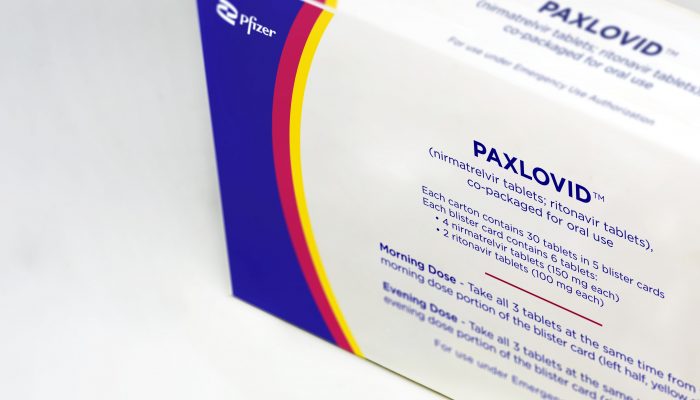When COVID-19 made its way into daily conversation in early 2020, other words soon followed – social distancing, mask, isolation, and quarantine among them.
By the end of 2020, when COVID vaccines were approved for distribution, two more words – pharmaceutical brand names, really – peppered our conversations and took on new meaning. As more and more people got vaccinated in 2021, we commonly asked, “Did you get Pfizer or Moderna?”
Last spring, another word – Paxlovid – seemed destined to make its way into everyday conversation. But the word and the drug it represents are still underutilized.
So, what is Paxlovid?
Paxlovid is an oral antiviral medication used to treat COVID. Last May, the U.S Food and Drug Administration approved its use for the treatment of COVID in people who are at risk for severe illnesses that could lead to hospitalization or death.
Studies have shown Paxlovid is highly effective at preventing hospitalization and death in vulnerable groups. The medication is recommended for non-hospitalized adults who are at risk of developing severe COVID. Those people include:
- older adults
- people with certain medical conditions
- people who smoke
- people who are obese
Paxlovid should be prescribed based on a person’s risk for severe COVID, and not based on the severity of their immediate symptoms. The disease may worsen to severe illness and death even if someone has mild symptoms at the start. Most COVID illnesses do not become severe for a week to 10 days. Paxlovid must be taken within five days of the onset of COVID symptoms for the medicine to be effective.
Why is Paxlovid underutilized?
People 65 years of age and older continue to be hospitalized for COVID at a higher rate than any other age group. Yet, a recent study of Medicare recipients found only about 5% of those people received Paxlovid prescriptions
Paxlovid is sometimes underutilized because it interacts with some medications. But in many cases the dosages of those medications can be adjusted or the medication can be briefly paused. This must be done on a case-by-case basis and there are resources available for doctors to quickly determine interactions and solutions. On rare occasions, a person cannot safely take Paxlovid. In those cases, doctors can consider other antiviral options.
Paxlovid is also underutilized because many people worry about COVID rebound. But most studies show that rebound, or a recurrence of symptoms after a person feels better for a few days, is unrelated to taking Paxlovid. In addition, it’s important to know rebound never leads to severe illness or death.
Before you get sick
- Talk to your doctor to see if Paxlovid would be right for you if you do get sick.
- Ask if any other medications you might be taking would need to be adjusted if you were prescribed Paxlovid.
If you test positive for COVID, notify your doctor immediately. If your doctor gives you a prescription for Paxlovid, have it delivered to your home or have a loved one pick it up for you so you can help keep other people safe.




